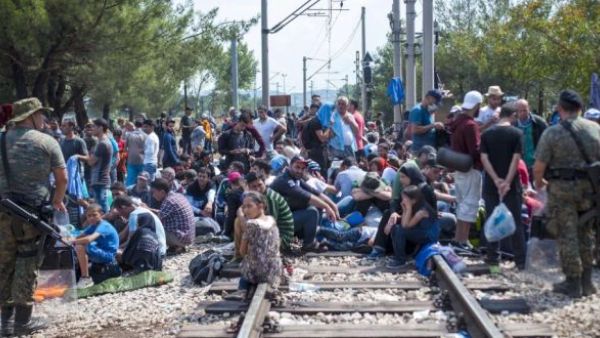More than 7,000 migrants are in limbo at an overcrowded camp on the border of Greece and Macedonia, according to Greek officials and media reports on Monday.
The camp in the border village of Idomeni was set up to shelter refugees as they wait for passage to Macedonia. It has a capacity of 2,000 people, and was intended only for brief stays.
On Saturday, Macedonia allowed 310 people to cross over, according to official figures from Skopje. On Friday, 22 migrants were permitted to enter.
The facilities in Idomeni are under such severe pressure that many migrants are forced to sleep in the open, wait for several hours to receive food and water and stand in long lines to use toilets.
TV reports from the camp showed scuffles breaking out and a group of protesting migrants blocking the nearby railroad on Sunday, forcing a train bound for Macedonia to reverse.
On Monday, 1,800 people arrived in Athens on a ferry from the Aegean islands, according to the port authority.
The UN refugee agency, UNHCR, said Sunday that about 3,000 migrants are arriving at the Greek islands each day.
Once they reach the mainland, they join thousands of people making the 600-kilometre journey north, to the border with Macedonia, and then further along the Balkan route towards western Europe, through Serbia, Croatia, Slovenia and finally Austria.
Greek authorities have taken steps to stem the flow of migrants from the islands and across the mainland ever since Macedonia closed its frontiers to all but a handful of Syrian and Iraqi refugees per day on February 20.
According to Greek media reports, more than 25,000 refugees were scattered across the country Sunday, including those at the Idomeni bottleneck and others still waiting on the islands.
If Macedonia maintains its border restrictions and the inflow does not abate, then the numbers of migrants stranded in Greece may grow to 70,000 by the end of March, the Greek minister in charge of migration, Ioannis Mouzalas, said over the weekend.
Mouzalas and other officials have been warning that Greece, which is still mired in economic woes, is not equipped to deal with a humanitarian crisis of this magnitude.
More than 120,000 people made it to Greece since the start of the year, after more than 1 million passed in 2015, mostly in the latter half of the year, according to the International Organization for Migration.








